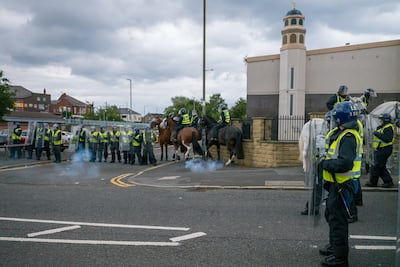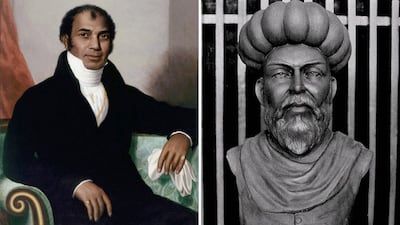The British Muslim Heritage Centre, in the heart of Manchester, is one of Europe’s leading venues showcasing major achievements of the Muslim world.
Its Gothic grade-two listed building towers over the industrial city, famed for its mills and immortalised in LS Lowry’s paintings, and is a hub for Britain’s Muslim community.
In the past year the need for the centre has become greater than ever, with Muslims facing hostility over the war in Gaza and last summer's riots in the UK, in which mosques and refugee hostels were attacked. In 2024 hate crimes reached a 10-year high, with Manchester one of the worst locations.
community project manager
Since it opened in 2006 following a £10 million refurbishment, the centre has been on a mission to celebrate and champion the accomplishments of Muslims around the globe and use their successes to educate people. Set in eight acres of grounds, the property hosts a museum and a number of exhibitions.
Cameras and codes
From an Ethiopian goat herder called Khalid, who discovered coffee after noticing his goats got excited after eating berries on his farm, to Sake Dean Mahomed who in the late 18th century introduced shampoo to the UK and became the "Shampooing Surgeon" to King George IV and William IV, youngsters are entertained by history boards in the centre.
The House of Wisdom also includes the accomplishments of 10th century mathematician Ibn Al Haytham, who invented the first pinhole camera; how cryptographer Al Kindi pioneered methods to solve codes, Al Khwarizmi's system to work out algebra and the creation of the first modern science lab by Muhammad Ibn Zakariya Al Razi. It also showcases the work of Ibn Al Nafis, who in 1210 became the first person to describe the pulmonary circulation of the blood. His work predates that of William Harvey in 1628.

Place of sanctuary
Teaching visitors about the achievements of Muslims pays a part in reducing hostility, say organisers at the centre.
“All the problems in the Middle East and the UK riots had a ripple effect on our community and we have had to support each other. We have been able to offer a safe place of sanctuary to people at a time of need,” community project manager Helina Malik told The National.
“We know a key way to tackle hate crime is to educate people. This venue is not just an educational facility for Muslim schoolchildren, it is for everybody.

“We want to showcase and shout from the rooftops the amazing work that has been done by Muslims throughout the centuries. It is important it is not forgotten, especially now. We open it up to everyone, not just Muslims. Often people do not realise the pivotal roles Muslims have played throughout history.
“I believe with all the hate crime happening, it could be reduced if this history and knowledge was shared.”
Her hopes could bear fruit as research by the Children’s Commissioner’s Office into what drove 147 young people to take part in the riots found it was primarily not driven by racist views, but factors including "a curiosity about events".
Stories of Sacrifice
As visitors explore the centre's ornate corridors, they come across the Stories of Sacrifice exhibition on the walls, which tells of Muslims' wartime achievements, including during conflict such as the Arab Revolt in the First World War.
“When children visit the exhibition and museum they are amazed," said Ms Malik. "Some didn’t realise so many Muslims were part of World War One or the important role they played in making Great Britain great. It gives Muslim youngsters a sense of belonging. I think schools need to bring Muslim history into the curriculum, the surprise on their faces when they see that Muslims were behind algebra and coding and medical advances is great to see.”

Manchester Museum and a private collector have loaned the centre historic artefacts and an exhibition includes ancient silver dirhams, carved pen cases and a Key of Ka’bah from Cairo among many relics.
“We are very lucky the museum has allowed us to exhibit these,” Ms Malik said. “It has a vast collection in its vaults and we are working with them to open a larger museum to showcase them all.”
Health research
The centre attracts more than 125,000 visitors every year and offers over 40 services, from youth groups to health and networking events, and a prayer room. It even helps to train Muslim doctors and dentists.
Since the Covid-19 pandemic it has opened its doors to allow its 60 bedrooms to house homeless people from the city. It has also been at the forefront of health research projects for ethnic communities to encourage people to seek help.
“There are lots of health inequalities for the Muslim community, from diabetes to cancer and cardiovascular disease, and we break down language and cultural barriers to raise awareness to educate people about them,” Ms Malik said. “We bring in professionals to talk to the community so people can ask questions. On our radio station we host experts to discuss these topics.”
One crucial role the centre plays is as a third-party reporting centre for hate crime. Staff are trained to report incidents on behalf of victims to the police and to help and support them.
Last year a survey by the Women’s Muslim Network found more than 80 per cent of victims of hate crimes since the riots have not reported them.
“If someone doesn’t want to go to the police, we are trained to speak to them and report it on their behalf. Our centre has been subjected to bomb threats, racist emails, racial slurs on the walls and our staff have been racially abused,” Ms Malik said.
“We know firsthand with the tensions in the Middle East and also during last year’s riots the issues people are facing with hate crime. We have seen a rise in the number of people coming to us for help. A lot of people became disengaged with the police. We became a sanctuary where people could come and talk about their problems and we could report hate crimes on their behalf and offer them support.”
Innocent lives lost
Events in the Middle East inspired the centre to pay tribute to youngsters who have lost their lives during the conflict in Gaza. Now, 16 olive trees adorn the majestic entrance as a poignant reminder.

“We wanted to pay tribute to all the innocent lives taken in the conflict so we planted these olive trees to represent the children who are no longer here and never to forget them,” she said. “It felt so close to our hearts and we felt helpless so we chose to mark their lives in this way.”
The centre shared with The National its ambitious £80 million plans for the future, which include an interactive museum and an Islamic garden designed by leading Islamic garden designer Emma Clark.
Ms Clark is behind the Islamic gardens at the new Royal Botanic Garden in Jordan and King Charles appointed her to designed the Carpet Garden, inspired by two Turkish carpets, at Highgrove House.

Presently the centre, which also boasts a Muslim radio station, is bustling with excitement as preparations are under way for Ramadan. Thousands of people descend on the centre during the holy month.
“We have lots to look forward to,” Ms Malik said. “In the future we are going to be bigger and better. We are already a community centre that pulls in many people and raises awareness on different topics and we want to expand on that.
“We have a vision, we know it won’t happen overnight, but there will be exciting times ahead for us.”


